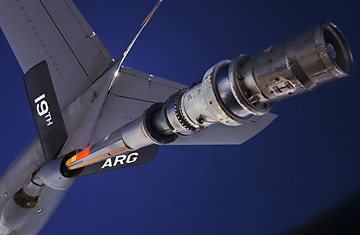
Air Force Tanker
The Air Force has always been the shiniest, most hardware-centric of the nation's military services. Whether it's the brooding bat-like B-2 bomber, the razor-sharp F-22 fighter, or the constellation of satellites that transmits everything from war plans to the GPS signal telling you where you are, the flyboys spare almost no expense in outfitting themselves with the state-of-the-art armament. This year, the Air Force is spending close to $65 billion — more than either the Army or Navy — developing new weapons. So at a time when politicians never tire of declaring their unbridled support for the men and women in uniform, you would think Washington could figure out a way to replace the Air Force's aging, half-century-old fleet of aerial refueling tankers.
You would, however, be wrong.
That was essentially the verdict delivered by Defense Secretary Robert Gates on Wednesday, when he officially gave up on the Bush Administration's tortured quest to purchase flying gas stations to replace the current fleet of KC-135 tankers, which average 47 years old. "How incompetent can the Air Force be?" Danielle Brian, head of the Project on Government Oversight, a private watchdog group, wondered following Gates' announcement. "Buying a tanker really shouldn't be this complicated."
Oh, but it has been. The Air Force has repeatedly fumbled the $35 billion competition between aerospace giants Boeing and Northrop-Grumman to build 179 new tankers. After pressure from Senator John McCain, who said the Air Force's plan to lease tankers from Boeing was a waste of taxpayer money, the Air Force in 2004 scuttled those plans. Then the service decided to buy them from Northrop Grumman last February, only to have the deal derailed in June after government auditors concluded Boeing's charges of an unfair competition were justified.
Most recently, Boeing has said it needs six months — not the 45 days offered by the Pentagon — to draft a new bid for a larger tanker than it originally offered (Northrop-Grumman's bigger plane had given it an edge). Boeing had threatened to pull out of the competition entirely if it didn't get additional time. That would have forfeited the contract to Northrop Grumman, but it also would have galvanized Boeing's congressional allies into opposing the sole-source award to Northrop, whose partner on the tanker project is Europe's Airbus consortium.
Given that track record, Gates says he had little choice. "It is my judgment that in the time remaining to us, we cannot complete a competition that would be viewed as fair and competitive in this highly charged environment," Gates told the House Armed Services Committee Wednesday. "I believe that the resulting cooling-off period will allow the next Administration to review objectively the military requirements and craft a new acquisition strategy" for future tankers.
Boeing praised the decision ("it will best serve the war fighter") while Northrop grumbled, saying it was "extremely disappointed — especially on behalf of our men and women in uniform who will now be denied a critically needed new tanker for years." Meanwhile, the Air Force resigned itself to flying ancient airplanes even longer. "I don't care which tanker wins," Air Force General Arthur Lichte, a one-time tanker pilot who now heads the Air Mobility Command, sighed last week. "I just need a new tanker."
Despite claims that the Pentagon only buys what's best for the troops, Gates' decision suggests what critics of the procurement process have long said — that major defense purchases are salted through with political implications ("This is a very political decision," Lichte said). That's especially true in the tanker contract, because Northrop Grumman's partnership with the Airbus consortium led to complaints that jobs would be lost overseas. It also makes clear that Gates' June decision to take away the Air Force's power to pick the winner and reserve it for himself wasn't sufficient to salve the wounds of the Air Force's botched efforts.
Moreover, the delay is further evidence that defense choices are always made on a sliding scale, balancing costs against risks. While Air Force officials have been arguing for years that new tankers were needed yesterday, Gates made it clear Wednesday that's not quite the case. Stepped-up funding for the aging tanker fleet, he said, will ensure they're kept safely flying until the Air Force finally gets its act together. Even Lichte, who began his career flying KC-135s more than three decades ago, conceded as much. "The 135 is doing pretty good," he said. "For an old airplane it's hanging in there."
